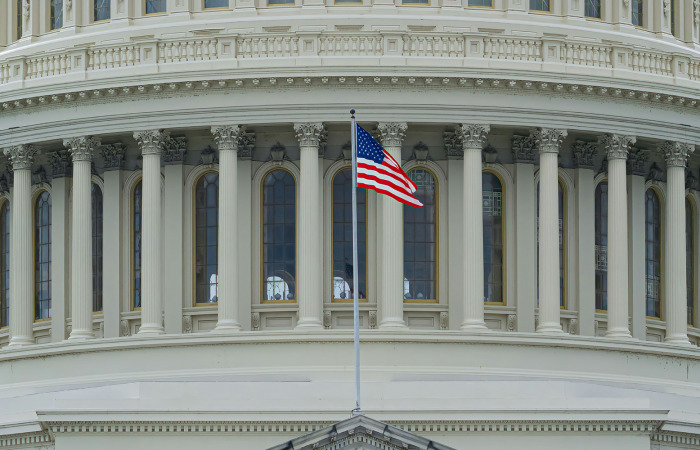As the country faces a shortage of cybersecurity professionals, Liberty’s nationally recognized program is producing the right employees for the job
Cybersecurity is more than a hot career field; it’s a raging inferno with over 300,000 current job openings and an expected 2 million in the coming years. High wages and signing bonuses are common at the entry level. While educational institutions are racing to meet the demand, the 60,000 qualified graduates around the country each year are not enough.

Executive Director Dr. Allen Harper brings more than 30 years of industry experience to Liberty’s Center for Cyber Excellence.
And the stakes are high: the security of our finances, personal information, businesses, and government — all interconnected in the ever-expanding digital world — are on the line.
Like most schools, Liberty University sees the importance of meeting workforce demands. But when employers come knocking in search of cybersecurity professionals, they don’t just come with a list of required skills; they come seeking individuals whom they can trust with sensitive information, workers who will use their knowledge only for the good of others. Liberty’s commitment to producing world-changers who are excellent in their fields and operate from a solid ethical foundation makes it the perfect place to shop for upstanding talent.
The gold standard
 This past summer, Liberty was formally recognized by the National Security Agency (NSA) and the Department of Homeland Security (DHS) as a National Center of Academic Excellence in Cyber Defense Education (CAE-CDE). The agencies’ joint goal in awarding the designation is to reduce the vulnerability of the national information infrastructure by promoting higher education and research in cyber defense and producing professionals with cyber defense expertise.
This past summer, Liberty was formally recognized by the National Security Agency (NSA) and the Department of Homeland Security (DHS) as a National Center of Academic Excellence in Cyber Defense Education (CAE-CDE). The agencies’ joint goal in awarding the designation is to reduce the vulnerability of the national information infrastructure by promoting higher education and research in cyber defense and producing professionals with cyber defense expertise.
“This is a very distinguished honor for Liberty and allows us to join a select community of schools with programs that demonstrate the nation’s highest levels of excellence in cybersecurity,” explained Dr. Allen Harper, executive director of Liberty’s Center for Cyber Excellence. “This designation is widely accepted as the gold standard for a cyber program.”
Liberty’s cybersecurity program, offered through the School of Business, underwent careful evaluation by the NSA and DHS to affirm that it meets the rigorous requirements. Earning the designation was a collaborative effort by several Liberty departments, including the Office of the Provost, Information Technology, IT Security, Registrar, Center for Academic Development, Jerry Falwell Library, Career Center, Marketing, and Creative Media, as well as the School of Nursing, Helms School of Government, and the School of Business.
The designation applies to Liberty’s largest cybersecurity degree, the Bachelor of Science in Information Technology with Data Networking and Security specialization. Liberty is working to earn the designation for its other five cybersecurity degree programs. While most university cybersecurity programs are general in nature and broadly focused, Liberty is doing something that other schools are not, Harper said.
“There are subspecialties within the field, and we cater our program to those subspecialties so that our graduates will be better equipped than someone who came out with a one-size-fits-all degree.”
Each program is designed to help graduates fill jobs such as security analyst or malware specialist, which have their own needed skill sets.
At the undergraduate level, in addition to the B.S. in Information Technology with Data Networking and Security, Liberty also offers a B.S. in Information Systems with Information Assurance specialization and a B.S. in Computer Science with Cybersecurity specialization. At the graduate level, it offers the M.S. in Information Systems with Information Assurance specialization, M.S. in Information Technology with Network Design and Security specialization, and M.S. in Cybersecurity. The bachelor’s degrees are available residentially, and all cybersecurity degree programs are also available online.
Liberty’s Center for Cyber Excellence establishes the university as one of the country’s premier locations for cybersecurity study and research and as a top destination for employers. A board of advisors includes representatives from local and national companies that employ cybersecurity professionals. Liberty’s new Office of Outreach and Business Engagement (read more) is also helping to build connections between students, faculty, and industry leaders.
“The driving force behind every change we implement in the School of Business is creating increasing value for our students,” said Dr. David Calland, interim dean of Liberty’s School of Business. “The needs of the employer are a priority in our curriculum. And that does a service to both our students, who are better equipped to land jobs and stand out as employees, and the employers, who can have confidence in the ability and work ethic of a candidate when they see ‘Liberty University’ on their résumé.”
Why Ethics Matter
Liberty has long distinguished itself in higher education with its unwavering Christian worldview in all areas of study. What that means to employers, however, is that at the university’s core is a commitment to instilling Christian values, including honesty and integrity, within its students. And when it comes to handling highly sensitive information or managing large assets, it is critical to be able to trust an employee.

Dr. Robert Tucker, associate professor of computer science,
spent 25 years in government intelligence prior to teaching.
The digital frontier is still being explored, and more and more hackers are abandoning ethics as they mine for data in an attempt to exploit, leverage, or ruin a company. Harper said that in a world of “black hat” hackers (criminals) and “white hat” hackers (the ethical ones who are hired to secure systems), it’s important to have skilled individuals who operate in the gray — people who work to understand the tools of the bad guys in order to beat them to the punch and help secure our data. He’s literally written the handbook on the topic (“Gray Hat Hacking: The Ethical Hacker’s Handbook”). Harper has assisted companies that have almost been destroyed by the work of a “black hat” hacker.
“CEOs say over and over that they need more ethical hackers with a strong moral compass,” Harper said. “Too few people care about ethics in our field. Liberty is at the forefront of ethical security practices, and the result of that is students who go out and impact the world.”
Liberty’s cyber students are being trained by world-class faculty, most of whom came to academia from years in the industry. Many continue to work in the field.
“Our faculty have decades upon decades of combined experience securing both public and private organizations, from Wall Street to Main Street and from the White House to the Department of Defense,” Harper said.
On average, Liberty graduates gain security clearance for jobs in the FBI’s Cyber Division faster than those from other institutions. And Liberty’s outstanding record with companies that have hired graduates (including Google and IBM) sets an expectation for future graduates who are trustworthy and operate with a strong moral code. That’s an invaluable reputation.
“When someone goes from student to graduate and then on to employee, the name Liberty University goes with them,” said Scott Hicks, interim provost. “That’s why we tailor cutting-edge programs to not only where companies are now but where they expect to be in the future.”
Building Community
Junior Charity Barker dabbled in cybersecurity before coming to Liberty, but she was not planning to major in it. As she got involved in the Cyber Defense Club — which trains students in computer and network security and allows them to put their skills to the test in competitions — she fell in love with the community. For the past two years, she’s served as the team president.
“The club has given me an opportunity to practice leadership skills that I otherwise would have only developed much later in life,” she said. “I’ve also gained a wealth of technical knowledge from members of the club; everyone brings a niche of technical knowledge to the table. My favorite part of the club is that it provides a safe learning environment to try new things, ask questions, and develop technical skills.”
She also mentors area high schoolers in the CyberPatriot program.
Liberty is committed to attracting the best talent for the frontlines of digital warfare. This fall, the university hosted its first annual Cyberspark Hackathon, a digital capture-the-flag event for high schoolers to compete for a $10,000 Liberty scholarship.
Barker appreciates that Liberty’s faculty not only provide her with knowledge that will help her stand out as a future job candidate but also give her freedom to expand that knowledge.
“My professors allowed me to complete major projects for the class on topics I was interested in,” she said. “I think that’s really important because it allows you to dig into and explore something you’re passionate about.”
Learn more at Liberty.edu/Cyber.




